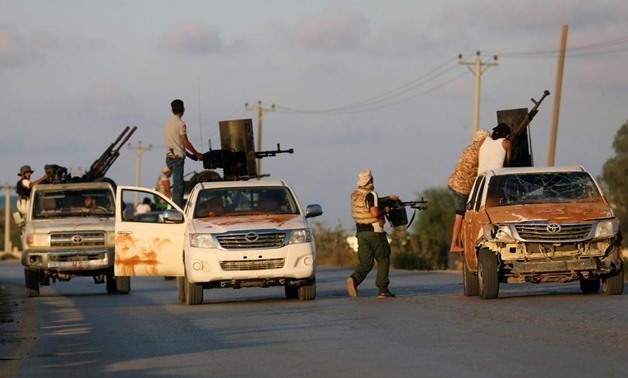
Militias allied to Libya's Government of National Accord fight rival groups in Tripoli in September 2018. Reuters
CAIRO - 18 January 2020: TASS acquired draft conclusions of the Berlin conference on Libya to be held on Sunday showing that the focus will be on six aspects that are military movements, security reforms, sanctions on those who breach arms embargo, special committee, ceasefire agreement, and economic reforms.
Participants in the conference call for the termination of all military movements in support of warring parties and “the establishment of unified Libyan national security, police and military forces under central, civilian authority, building upon the Cairo talks, and the documents produced there-in.”
The draft conclusions advocate the enforcement of UNSC sanctions against those who breach Resolution 1970 (2011) and the Council’s subsequent Resolutions, including the proliferation of arms from Libya.
"We herewith create an International Follow-Up Committee (IFC) in order to maintain coordination in the aftermath of the Berlin summit, under the aegis of the United Nations," the document says according to TASS.
The draft proposes that all parties concerned agree on a truce coupled with militias dismantling urging "the redeployment of heavy weapons, artillery and aerial vehicles and their cantonment."
"We call upon the United Nations to facilitate ceasefire negotiations between the parties, including through the immediate establishment of technical committees to monitor and verify the implementation of the ceasefire," the document adds as reported by TASS.
The document also stresses the necessity of launching a reconstruction program “under the auspices of a new representative and unified government of national accord exercising its authority over all Libyan territory, to develop the severely affected areas.”
Spokesperson of the Libyan National Army (LNA) Ahmed al-Mesmary announced on Saturday that the move of oil ports and fields shutdown was made by Libyan people and that it is the Armed Forces’ duty to protect citizens.
On Friday, protesters entered Zueitina oil port northeastern Libya and closed it as tribes’ leaders in the east and south of the country announced a day earlier that the operation of all oil terminals in areas controlled by LNA will be stopped. The tribes leaders’ reason for the action is that the Government of National Accord (GNA) protected by militias uses oil revenues to pay for foreign fighters.
The National Oil Corporation (NOC) announced on Saturday that the General Command of the Libyan Armed Forces and the Petroleum Facilities Guard ordered the administrations of Sirte Oil Company, Harougue Oil Operations, Waha Oil Company, Zueitina Oil Company, and Arabian Gulf Oil Company to stop exports from the ports of Sider, Zueitina, Harigua, Brega, and Ras Lanuf.
Germany announced that the countries taking part in the conference hosted in Berlin on Libya Sunday include the United States, Russia, China, France, Italy, United Kingdom, Turkey, and others. Germany declared that Commander of the Libyan National Army (LNA) Khalifa Haftar will attend while Prime Minister of the Government of National Accord (GNA) Fayez al-Sarraj confirmed his participation.
The negotiations held Monday in Moscow by Commander of the Libyan National Army (LNA) Khalifa Haftar and Prime Minister of Tripoli-based Government of National Accord (GNA) Fayez al-Sarraj ended without reaching a truce agreement, Extra News reported citing Russian media.
The LNA had announced earlier on Monday that it would not withdraw from the territories it conquered in Tripoli’s outskirts, and that it is determined to free the entire Libyan soil from militias and terror groups.


Comments
Leave a Comment